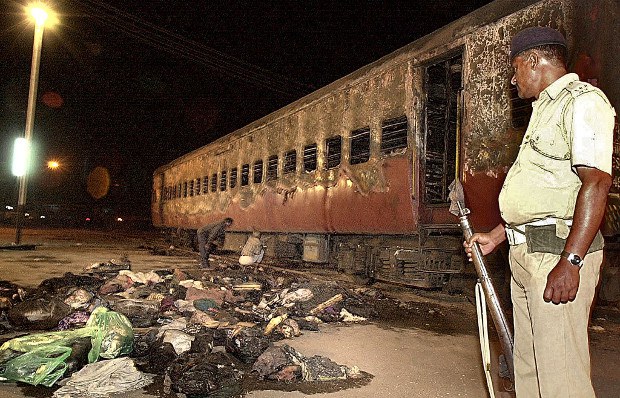India: Court Commutes Death Sentences for 11 Convicted of 2002 Gujarat Attack
2017.10.09
Mumbai
 An Indian police officer looks over the burned train at Godhra station where 59 Hindu activists were killed, Feb. 28, 2002.
An Indian police officer looks over the burned train at Godhra station where 59 Hindu activists were killed, Feb. 28, 2002.
An Indian court on Monday commuted the death sentences of 11 men convicted of starting a train fire that led to communal riots in Gujarat state during which hundreds of people were killed in 2002.
The men, all Muslims, could instead spend the rest of their lives in prison, but will be eligible for parole, for causing the fire inside the Sabarmati Express train in Godhra that left 59 Hindu activists dead.
The incident unleashed widespread religious violence that killed more than 1,000 people – a majority of them Muslims – during a week of bloodshed in the western Indian state, according to official figures.
The 11 men are among 31 people who were convicted in 2011 and had appealed their sentences to the Gujarat High Court. The court upheld life sentences ordered for the other 20 convicts.
A life sentence in India means a convict spends his entire life in prison with a possibility of parole after completing 14 years of the sentence.
In addition, the court declared the state government, which was then headed by India’s current Prime Minister Narendra Modi, and the Indian Railways failed to prevent the violence and ordered the government to pay compensation of 1 million rupees (U.S. $15,287) to the families of each fire victim, public prosecutor J.M. Panchal said.
“The compensation will be paid by the state government as it is the government’s responsibility to maintain law and order,” Panchal told BenarNews.
Modi, Gujarat’s chief minister back in 2002, was accused of complicity during the anti-Muslim riots, but was acquitted of all charges in 2013 due to lack of evidence.
Government officials plan to challenge the order.
Panchal said he was not satisfied with the High Court’s decision to reduce the punishment for the 11 convicts and “will be challenging the verdict” in the Supreme Court.
Defense lawyer I.H. Syed said all 31 convicts would also appeal their life sentences in the Supreme Court.
Yusuf Hoka, a relative of one of a convict who had his death sentence commuted, said he was relieved at the order.
“We are still talking to our lawyer to plan the next move. Most of the accused have already spent more than 15 years behind bars,” Hoka told BenarNews.







